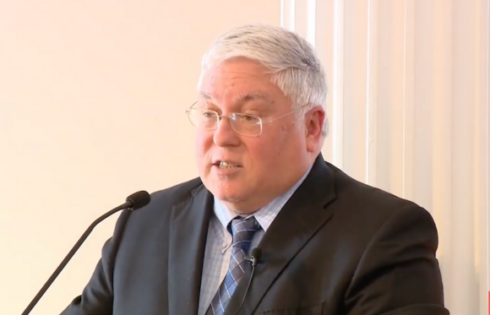
Teachers wrongly ‘expect different treatment’ than students
Teachers cannot cite the First Amendment to shirk their duties to schoolchildren, their parents and taxpayers.
That was the blunt conclusion of a federal judge who ruled against Kentucky teachers that participated in a “sickout” to protest state legislation.
U.S. District Judge Danny Reeves rejected the Jefferson County Teachers Association’s argument: that state subpoenas to identify teachers for a potential “illegal work stoppage” violated their First Amendment rights.
“Students are expected to attend classes. If they fail to do so without a valid excuse, their absence is duly-noted and appropriate action is taken,” Reeves wrote. “But the teachers at the center of this controversy expect different treatment.”
The state itself was divided on the case. Labor Cabinet Secretary David Dickerson, appointed by Republican Gov. Matt Bevin, issued the subpoenas, but Democratic Attorney General Andy Beshear went to Franklin Circuit Court to block them.
The ruling did not register a protest from UCLA’s Eugene Volokh, a First Amendment expert. The law professor mentioned the ruling on his eponymous blog late last month without critiquing it.
Brent McKim, president of the Jefferson County Teachers Association, told the Louisville Courier Journal that union members would receive legal representation if fined. It will “advocate for their right to engage as citizens in the democratic process.”
Beshear, a possible challenger to Gov. Bevin, characterized the subpoenas as an attempt “to intimidate and attack” the state’s “underpaid public servants.”
This is at least the second blow to activist absentee teachers in recent years. The Colorado Supreme Court upheld a ruling against a teachers union whose members faked sickness, holding that state public records law did not exempt teacher-absence records.
MORE: Court rules teachers who fake being sick to protest can be unmasked
‘These harms were neither insignificant nor trivial’
On a number of days this past school year, multiple Kentucky school districts had to close their doors at the last minute because so many teachers called in sick to protest education-related bills at the state capitol.
This left “many parents and students scrambling to make alternate arrangements,” Reeves wrote in his case summary. The Kentucky Department of Education said the number of teachers calling in sick was “abnormally high” and “numbered in the thousands.”
Not only did children miss classes and parents have to seek emergency child care, but “ACT testing was affected in at least one district by the teachers’ actions,” Reeves wrote: “These harms were neither insignificant nor trivial. They affected real people in real and substantial ways.”
In response, the Kentucky Labor Cabinet subpoenaed 10 school districts to determine if the teachers had broken the work-stoppage law.
Applying a four-factor test, Judge Reeves refused to issue an injunction against the subpoenas, as requested by Beshear and the teachers union.
The claims did not show a strong likelihood of success on the merits, Reeves concluded: The subpoenas were within the authority of the Labor Cabinet and the sickouts likely counted as a work stoppage or strike.
The court rejected the argument that the subpoenas infringed on the teachers’ First Amendment rights as well. Their “constitutional rights do not allow them to violate the law,” Reeves said.
For that reason, the teachers are unlikely to face an irreparable threat of injury that an injunction would prevent. The judge also noted that the Kentucky Department of Education had already turned over the names of many of the absentee teachers, meaning that the alleged harm had already occurred.
An injunction would also hinder the Labor Cabinet in the future from investigating further sickouts, which would harm “other employees of the school systems, parents, students, and taxpayers,” the judge reasoned.
The public interest would not be served if the state could not investigate potential violations of law, damaging the public’s perception of the government, Reeves continued: Taxpayers and citizens also have an interest in schools that they pay for staying open.
He had stern words for the teachers. “Some may think that the claims asserted in this action stand logic on its head—and they may be correct,” the judge wrote. The teachers assert “that the Secretary of the Labor Cabinet should look the other way when they avoid their employment obligations by improperly claiming to be sick.”
MORE: School-choice group wins open-records lawsuit
IMAGE: pathdoc/Shutterstock
Like The College Fix on Facebook / Follow us on Twitter






Please join the conversation about our stories on Facebook, Twitter, Instagram, Reddit, MeWe, Rumble, Gab, Minds and Gettr.